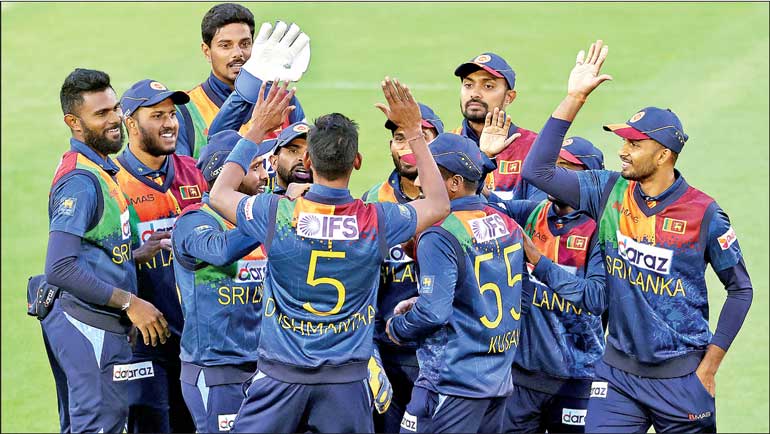Tuesday Feb 17, 2026
Tuesday Feb 17, 2026
Wednesday, 28 December 2022 00:05 - - {{hitsCtrl.values.hits}}

When true achievements have eluded a country, even an occasional victory at a sporting event is glorious
“For millions of years, humans hunted smaller creatures, gathering what they could, all the while being hunted by larger predators. And only in the last 100,000 years – with the rise of Homo sapiens – that man jumped to the top of the food chain.
That spectacular jump from the middle to the top had enormous consequences. Other animals at the top of the pyramid, such as lions and sharks, evolved into that position very gradually, over millions of years. Most top predators of the planet are majestic creatures. Millions of years of domination have filled them with self-confidence.
Sapiens by contrast, is more like a banana republic dictator. Having so recently been one of the underdogs of the savannah, we are full of fears and anxieties over our position, which makes us doubly cruel and dangerous. Many historical calamities, from deadly wars to ecological calamities, have resulted from this over hasty jump” – ‘Sapiens – A Brief History of Humankind’ – Yuval Noah Harari

Like the country, Sri Lankan sports, more often than not, are in the news for the wrong reasons. Athletes failing to reach the required standards to compete internationally, a medal tally far below expectations, so called national players routinely decamping in foreign countries, unbecoming campaigns for office in sporting bodies, domination of sports administration by well-known wheeler dealers and commission agents, sports officials hogging office for decades to even sexual misadventures form the sorry narration of our sports.
The recent case of the Sri Lankan cricketer arrested on allegations of sexual assault while on tour in Australia is only an episode in a long tale of woe afflicting our cricket, the only game in which we can claim an acceptable adeptness with some degree of assurance. Another creation of the British, masterful empire builders and initiators of many a sport, cricket by and large is limited to Britain and her former colonies. Our aptitude in the game has driven us to embrace it with a passion, perhaps equalling our other great national fixation, politics.
Although it was not apparent then, the arrival of the European powers on our shores was the death knell for the political/social systems we were trapped in for nearly 2,000 years prior. When the British left in 1948, every Sri Lankan had a vote, a representative form of government, written laws, a professional and independent judiciary, a free media; all new ideas and concepts. How they have performed in the untested soil of the adopting country is another matter.
To assess our capacities, we need to compare ourselves with other former colonies, bearing in mind the length of time since independence. The general consensus is that we have performed poorly, those gaining leadership in the new institutions of governance interpreting the system only as an opportunity to advance personal ambitions and their family interests, their social DNA has inclined them to work on those lines.
They may mimic the doings of the mother of parliaments, don the Western dress or speak with a mock accent, but ultimately the twain shall never meet. Clearly, there is a huge mismatch between the complex requirements of the new systems, and the personnel available at hand in this country; men sorely wanting in their essential make-up as well as in skill and attitude. But then, in our parliament we hear a different story, in a strange metatextual exercise, some of them who have been there for nearly half a century, are now referring to long-term economic reforms.
Our politics may be a recurring botch, an endless parade of oddments and weirdoes grabbing the stage. Every government starts with loud fanfare, to end only with a whimper. Comparative statistics of other countries in the region are deeply embarrassing, only underlining a nation’s inabilities. This repeated failure however, has not dimmed the Sri Lankan fixation with politics. Prophets and self-proclaimed doers keep coming out of the woodwork by the hour, some doing it umpteen times.
The fever is unflagging, where the politicians appear, the people throng; open mouthed, vacuous. Most of TV time is devoted to politics in its various manifestations.
Sri Lankan sports is not any different. We may be unheard of in international soccer, rugby, netball, track and field or swimming, but in the words of the sports officials, the lion is slowly awakening. If truth be told, no junkets, no beneficial deals or no social climbing for these so called promoters of sport!
Like many British inventions, cricket is a fascinating game. Its peculiar amalgam of rules and demands, enables a people not particularly known for their athleticism, strength or stamina to still do well, and, at least occasionally come up on top. Here again, the truly endowed, like Australia or West Indies can perform consistently, dominating for decades, but the little guys may also lift the cup on and off in this game of glorious uncertainties.
Sri Lanka’s victory at the limited over world cup about three decades back changed our cricketing landscape for good. When true achievements have eluded a country, even an occasional victory at a sporting event is glorious. It is fantasy of course, a nation does not become great because of a win at a cricket match, nor does it become a sporting powerhouse overnight. But the enthusiasm was overwhelming, self-feeding, we belonged with the greats of the game!
The game overnight attained a semi-religious status, its leading cricketers honoured like demi-gods, they were feted across the country. Every word of theirs was listened to with rapt attention, and not only on cricket. If a similar attitude was adopted by a recognised sporting nation like Australia whose sportsmen have been world champions repeatedly, not only in cricket, but in nearly every sport, Australia would have to rejoice every day. And, if they had a culture which endorsed world-class sportsmen to the parliament, their parliament would be over-flowing with sporting talent. Being of the cultures which evolved both the parliament as well as the game of cricket, the difference between sports and politics is not a concept the Australians are struggling with.
Success has many fathers; officials, cheerleaders, coaches, politicians, even shamans claimed ownership of that victory in 1996. Even “god’ was evoked, apparently he is a cricketing enthusiast, with a partiality towards our little island. Despite the country’s desperate economic conditions, money flowed to the game, and before long, there was talk of corruption, undesirable elements in the cricket administration, match-fixing, lucrative contracts, players with unexplained wealth; that one victory unbalanced the one game which enabled us to compete more or less on an equal footing, perhaps a case of too much, too soon.
Needless to say, when a player represents his country abroad, he is also a sporting ambassador. Unlike in individual sports, a team player rises or falls with his team. Any controversy an individual player is embroiled in, will also reflect on his team.
Understandably, there were a range of reactions to the incident in Australia. Some condemned the cricketer, some studiously avoided giving an opinion, while another group thought their national affiliation called upon them to thrash the alleged female victim and the legal process involved. Since the matter is pending in court, we really cannot say much on it now.
However, this incident opens another dialog which is of far more immediacy to our people, particularly to the female half of the population – the issue of gender-based violence and a woman’s right to say no.
In certain societies, not so long ago, a female baby was considered a liability, sometimes in extreme cases even destroyed at birth. Girls were more or less a property of the parents, she was strictly supervised, schooling was not encouraged, and they decided who she married. The girl, barely in her teens, is married off, to become the property of the man who is her husband, her fate now in his hands and that of his family. With improving economic conditions and widening awareness, there is a global movement today for equality and the further empowerment of women. Not only human rights, even animal rights have come into sharp focus. Enlightened jurists and dedicated advocacy groups are pushing evermore the boundaries of rights and freedoms, making the world a safer and softer place for its inhabitants.
These advances have brought with them, new legal concepts, like marital rape. The Supreme Court of India in a recent judgement endorsed the concept, essentially, non-consensual sex being defined as rape, whether the parties were married or not. After all, it is her body, in such a case of non-consensual sex within a marriage, the woman having a right to an abortion. A woman’s right to say no at any stage of intimacy, even with her husband, is now accepted as fundamental to her human dignity. Archaic minds and barbaric cultures may scoff, but the ship of human rights sails ever further.
Although we too may have borrowed many of these fine concepts from advanced jurisdictions, there is very little social awareness of the issues; our women remain extremely vulnerable at every point. Sexual harassment of women at the work place, on the road or even in their own homes is distressingly common. Almost on a daily basis they are subject to aggressive propositioning, lewd comments, unwelcome groping or repulsive ogling.
Laws alone cannot protect the women, unless a deeper sense of human dignity pervades the culture. When the businessman bribes all and sundry, the politician perverts every system, sports officials hog office and the sportsman violates his ethics all too readily, sexual harassment may sound like a minor misdemeanour.
As Professor Harari observed, a too hasty a jump in status is difficult to handle.